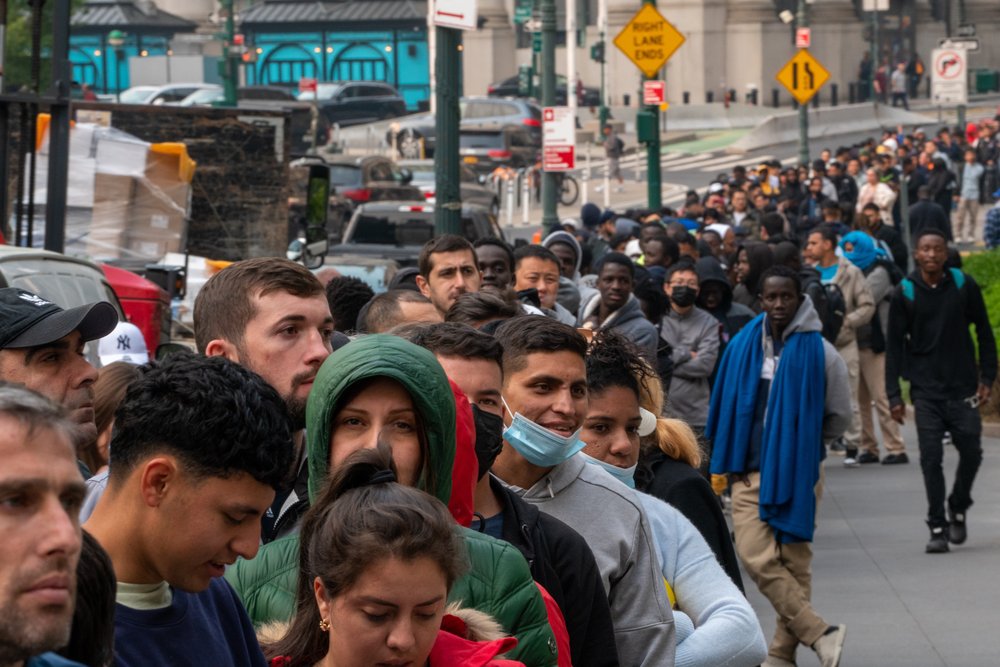State lawmakers pitch 'no limits' on shelter stays for New York migrants
Feb. 14, 2024, 5:01 a.m.
A proposal from state legislators would bar the city and state from enacting any limits on those staying in shelters.

New York City, struggling to accommodate some 70,000 migrants in its care, could no longer cap or limit stays for those being housed in city shelters, under a measure being pushed by two state lawmakers.
The prohibition from Assembly member Catalina Cruz and Sen. Brad Hoylman-Sigal would apply to any city or state government agency, barring them from removing anyone in a shelter or emergency housing except under narrow circumstances, such as the person’s being in imminent danger.
The measure comes as the city continues to roll out 30- and 60-day stay limits for migrants, many of whom have been in the shelter system for far longer. The city administration has said the stay limits aim to free up beds for newer arrivals and nudge migrants to find their own housing. The two city Democrats contend the limits are unwarranted.
The dispute highlights the continuing disagreement among elected officials, policymakers, housing and migrants’ advocates, and ordinary New Yorkers as well, on what the social safety net should be for migrants–in a city long portrayed as welcoming to immigrants.
“The City Administration’s decision to arbitrarily evict families with children and single adults from our city’s shelters after 60 and 30 days, respectively, is cruel and unnecessary,” Hoylman-Sigal said in a statement. Cruz added their proposal was “more than a policy change; it’s a commitment to human rights and a testament to New York’s enduring spirit of inclusivity and compassion.”
Mayor Eric Adams, in a briefing with reporters Tuesday, rejected calls to undo the 30- and 60-day stay limits. He credited the limits with spurring the newcomers to “take the next step on the journey in this country to pursuing the American dream.”
He said the city’s “humanitarian responsiveness” had left “not one child, not one family, not one individual” to sleep on the street.
“What we have done is working,” Adams said.
Some 177,000 migrants, mostly asylum-seekers, have come to the city in an influx that began in spring 2022; some 70,000 remain in the city’s care, based on city figures. The Independent Budget Office said in December it will cost $6 billion to $7.8 billion to care for the migrants over the next two years.
The IBO figures are billions of dollars less than earlier estimates from the Adams administration—savings the IBO attributed in part to migrants leaving the shelter system at a quicker pace, spurred by the 30- and 60-day stay limits. The state lawmakers offered no estimate for the cost of their proposal or its impact on the city’s shelter population. Their offices did not immediately respond to requests for comment.
Muzaffar Chishti, a senior fellow and director of the Migrant Policy Institute office at New York University School of Law, has likened the city’s “universal right to shelter” to a “magnet” drawing migrants to New York, with word of the housing policy widely spread on social media–a factor not present during the nation’s earlier immigration waves. This is so, Chishti told Gothamist in an earlier interview, “Especially for migrant arrivals who had no in-built connection to networks in the U.S., who didn't have a family, who didn't have someone from their old village.”
New Yorkers have expressed ambivalent views on homelessness and migrants. In a HarrisX poll last month, 4-in-5 adult New Yorkers said they support the city “right to shelter” guaranteeing shelter “to every resident in need.” At the same time, just 58% agreed that the city’s “right to shelter should include all families in need, including asylum-seekers”; and 42% agreed that “the right to shelter should be limited to only New York families.”
In the same survey, 85% agreed with the statement that “every New Yorker in need should be entitled to a roof over their heads and a bed to sleep in until they get back on their feet.” At once, 57% said migrants and asylum-seekers with children should be required to reapply for shelter every 60 days; while 56% backed a 30-day requirement for migrants and asylum-seekers without children.
HarrisX surveyed a representative 1,051 adults from all five boroughs in November and December. The survey had a margin of error of 3.02 percentage points. It was commissioned by the New York Immigration Coalition and the shelter provider WIN.
Some migrants uprooted from NYC shelter had long waits for new beds New Yorkers back ‘right to shelter,’ but hold ambivalent views on housing migrants How Mayor Adams and President Biden helped set the stage for immigration reform, however unwittingly Mayor Adams is moving migrants out of NYC shelters, but where are they landing? In Harlem’s ‘Little Senegal,' West African migrants find community and challenges